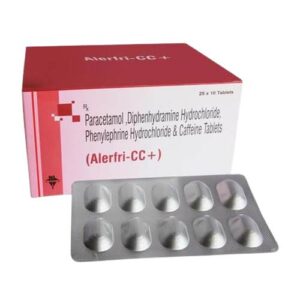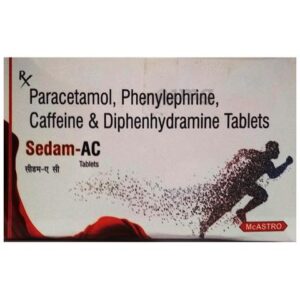PARACETAMOL (ACETAMENOPHEN) + DIPHENHYDRAMINE + CAFFEINE + PHENYLEPHRINE
Paracetamol (acetamenophen): Paracetamol, also known as acetaminophen, is a common over-the-counter medication used to relieve pain and reduce fever. It belongs to the class of medications called analgesics (pain relievers) and antipyretics (fever reducers). Paracetamol is available in various forms, including tablets, capsules, syrups, and suppositories.
The exact mechanism of action of Paracetamol is not fully understood. It is believed to work by inhibiting the synthesis of prostaglandins in the central nervous system, which helps in reducing pain and fever. Prostaglandins are chemicals involved in the inflammatory response of the body.
The recommended dose of Paracetamol varies depending on age and weight. For adults and children over 12 years old, the typical dose is 500-1000 mg every 4 to 6 hours, not exceeding 4000 mg in 24 hours. For children, the dose should be based on their weight and it is important to follow the instructions provided by a healthcare professional or included with the product.
Paracetamol is generally well-tolerated when used in recommended doses. However, like any medication, it can have side effects. Common side effects include nausea, stomach upset, and skin rash. Rare but serious side effects can include liver damage, especially if taken in high doses or combined with alcohol. It is important to adhere to the recommended dose and duration of treatment to minimize the risk of side effects.
Before taking Paracetamol, it is important to inform your healthcare provider about any existing medical conditions or medications you are taking, as certain conditions or medications may interact with Paracetamol. It is also advisable to follow the instructions on the packaging or consult a healthcare professional if you have any concerns or questions regarding the use of Paracetamol.
Diphenhydramine: Diphenhydramine is an antihistamine drug that is commonly used to relieve symptoms of allergies, hay fever, and the common cold. It is also used as a sleep aid and to treat symptoms of motion sickness.
The mechanism of action of diphenhydramine involves blocking the effects of histamine, a natural substance in the body that is responsible for causing allergic symptoms. By blocking histamine, diphenhydramine helps to alleviate symptoms such as itching, runny nose, sneezing, and watery eyes.
Diphenhydramine is available in various forms, including tablets, capsules, liquid, and topical creams. The recommended dose varies depending on the age and condition being treated. For adults and children 12 years and older, the typical oral dose is 25-50 mg every 4-6 hours as needed. For children 6-12 years, the recommended dose is 12.5-25 mg every 4-6 hours as needed. It is important to carefully follow the dosing instructions provided by a healthcare professional or as stated on the packaging.
Although diphenhydramine is generally considered safe and effective, it can cause certain side effects. Common side effects include drowsiness, dizziness, dry mouth, blurred vision, constipation, and urinary retention. These side effects are usually mild and temporary. In some cases, diphenhydramine can cause more serious side effects such as allergic reactions, difficulty breathing, and rapid or irregular heartbeat. If any severe side effects occur, immediate medical attention should be sought.
It is important to note that diphenhydramine may interact with certain medications, including sedatives, tranquilizers, and monoamine oxidase inhibitors (MAOIs). It is recommended to inform your healthcare provider about all medications you are taking to avoid potential interactions.
Overall, diphenhydramine is a widely used antihistamine drug that provides relief from allergy symptoms and aids in sleep. It is important to follow the recommended dosage and be aware of potential side effects and drug interactions.
Caffeine: Drug: Caffeine
Use: Caffeine is a central nervous system stimulant that is primarily used to stimulate alertness and reduce fatigue. It is commonly consumed in beverages such as coffee, tea, and energy drinks.
Mechanism of Action: Caffeine works by blocking the action of a neurotransmitter called adenosine, which promotes sleep and relaxation. By blocking this receptor, caffeine stimulates the release of other neurotransmitters like dopamine and norepinephrine, leading to increased alertness and improved cognitive function.
Dose: The recommended dose of caffeine varies depending on the individual’s tolerance and the desired effect. For adults, a moderate intake is typically considered to be around 200-300 milligrams per day. However, it’s important to note that high doses or excessive consumption can lead to negative side effects.
Side Effects: Some common side effects of caffeine include increased heart rate, elevated blood pressure, restlessness, anxiety, jitters, and insomnia. High doses or caffeine sensitivity may also cause digestive issues such as stomach upset, acid reflux, and diarrhea. Additionally, withdrawal symptoms such as headache, fatigue, and irritability may occur if caffeine consumption is abruptly stopped after prolonged use.
It’s worth mentioning that caffeine can interact with certain medications and may not be recommended for individuals with certain medical conditions, such as heart problems or anxiety disorders. It’s advisable to consult a healthcare professional before starting caffeine use as a supplement or consuming it in high amounts.
Phenylephrine: Phenylephrine is a medication commonly used as a nasal decongestant. It helps relieve stuffy nose and sinus congestion caused by colds, allergies, or other respiratory illnesses.
The mechanism of action of Phenylephrine involves the activation of alpha-adrenergic receptors in the smooth muscle lining the blood vessels in the nasal passages. By constricting these blood vessels, it reduces blood flow and swelling, leading to nasal decongestion.
Phenylephrine is available in various forms, including oral tablets, nasal sprays, and eye drops. The recommended dose and route of administration depend on the specific formulation and the condition being treated.
For nasal congestion, the usual adult dose of Phenylephrine is 10 to 40 mg every 4 hours as needed. The nasal spray should be used as directed, typically 2 to 3 sprays in each nostril every 4 hours. However, it is important to follow the specific instructions provided by the healthcare professional or read the package insert before using the medication.
As with any medication, Phenylephrine can cause certain side effects. Common side effects include headache, dizziness, nervousness, restlessness, increased heart rate, increased blood pressure, and difficulty sleeping. These side effects are usually mild and resolve on their own. However, if they persist or worsen, it is recommended to consult a healthcare professional.
Some individuals may be more sensitive to Phenylephrine or may experience rare but serious side effects such as severe allergic reactions (rash, itching, swelling), chest pain, difficulty breathing, or irregular heartbeat. If any of these severe side effects occur, immediate medical attention should be sought.
It is important to note that Phenylephrine should be used as directed and for the recommended duration. Prolonged or excessive use of Phenylephrine nasal sprays can lead to rebound congestion, where the nasal passages become even more congested once the medication wears off. Phenylephrine should also be used with caution in individuals with certain medical conditions such as high blood pressure, heart disease, or thyroid problems.
Overall, Phenylephrine is an effective nasal decongestant commonly used to alleviate symptoms of nasal congestion. However, it is essential to use it responsibly and to consult a healthcare professional if there are any concerns or questions about its use or potential side effects.


